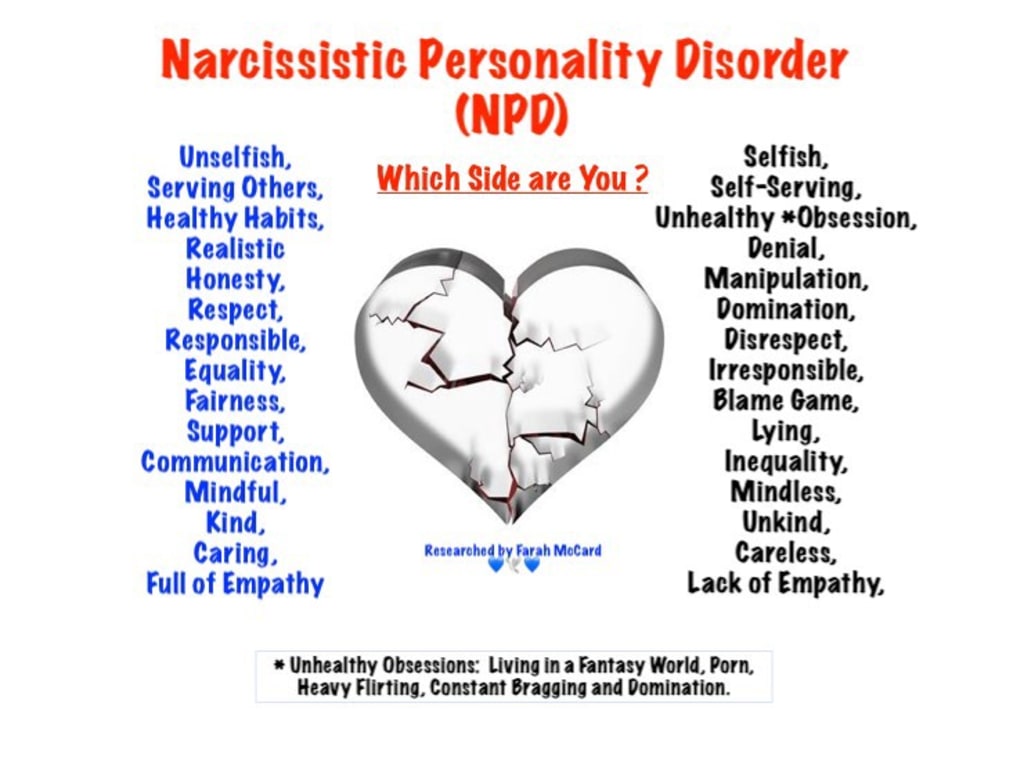Narcissist Personality Disorder
Ever feel like your partner is bossy or controlling? Ever feel like no matter what you do it is never good enough? I know the feeling as do many others who can relate. Know the signs to cope in situations like that.

Do we know when we encounter a narcissist? Are they able to be pointed out? No, unfortunately we all have a little of narcissism in us, however not as much as others. Here I’ll explain what narcissist personality disorder is. Also, will talk about treatment, when to see a doctor, complications, symptoms, risk factors, prevention and two types of narcissist personality disorder.
Definition
Narcissistic personality disorder also known as NPD is a disorder in which a person has an inflated sense of self-importance. One of several types of personality disorders that are out there. It is a mental condition in which people have an inflated sense of their own importance, a deep need for excessive attention and admiration, troubled relationships and a lack of empathy for others. The most accurate things to say about people with this disorder is that they are in love with an idealized, grandiose image of themselves. They are extremely sensitive and react badly to even the slightest criticisms or disagreements which they view as personal attacks. In psychological terms, narcissism doesn’t mean self-love at least not of a genuine sort. They’re in love with this inflated self-image precisely because it allows them to avoid deep feelings of insecurity. They may find that their relationships are unfulfilling and others may not enjoy being around them. They also will have problems at work, school or financial affairs. People with this disorder may be generally unhappy and disappointed when they’re not given the special favors or admiration that they believe they deserve. They are extremely resistant to changing their behavior, even when it’s causing them problems. Often described as cocky, manipulative, selfish, patronizing and demanding. Their tendency is to turn the blame on to others.
How common is NPD
An estimate of up to 5% of peopled have NPD. Narcissism is one of 10 personality disorders. This disorder causes people to think, feel and behave in ways that hurt themselves or others. Usually, will appear in the late teen years and early adulthood. NPD is commonly found in men but women can have it too.
Symptoms
They believe they are unique or “special” and can only be understood by other special people. They are too good for anything average or ordinary. They only want to associate and be associated with other high-status people, places and things. Which in the real world isn’t the case and can be a trigger for reaction. You’ll notice that they will often exaggerate or outright lie about their achievements and talents. They expect recognition even when they’ve done nothing to earn it. May experience grandiosity, callous and unemotional traits, excessive need for admiration or social isolation, disregard for others’ feelings, an inability to handle any type of criticism and a sense of entitlement (better than everyone else).
You’ll notice they exploit others without guilt or shame which means: they never develop the ability to identify with the feelings of others or able to put themselves in other people’s shoes. They lack empathy and view the people in their lives as objects just there to serve their needs. A consequence to that: they don't think twice about taking advantage of others to achieve their own ends. Sometimes this interpersonal exploitation is malicious, but often it is simply oblivious. They simply don’t think about how their behavior affects others and if you point it out, they still won’t truly get it. The only thing they understand is their own needs.
Narcissist live in a fantasy world that supports their delusions of grandeur. Since reality doesn’t support their view of themselves, they choose to live in a fantasy world propped up by distortion, self-deception and magical thinking. They spin self-glorifying fantasies of unlimited success, power, brilliance, attractiveness and ideal love that make them feel special and in control. The fantasies protect them from feelings of inner emptiness and shame, so facts and opinions that contradict them are ignored or rationalized away. Anything that threatens the fantasy bubble is met with extreme defensiveness and even rage, so those around them learn to tread carefully around their denial of reality.
They feel a sense of entitlement because they consider themselves special, they expect favorable treatment as their due. They truly believe that whatever they want, they should get. They also expect the people around them to automatically comply with their every wish and whim. If you don’t anticipate and meet their every need, then you’re useless. Keep in mind if you decide to defy their will or “selfishly” ask for something in return, prepare yourself for aggression, outrage or the cold shoulder. Remember it is all about them and in their mind, you don’t need or want anything, only they do.
The signs and symptoms to look out for will vary. Each person has something different in their personality but a common sign and symptom will always be self-importance also known as grandiose. Look out for monopolize conversations and belittling or looking down on people they perceive as inferior. Envious of others and believe others envy them. Most common signs to notice would be behaving in an arrogant, haughty manner, conceited, boastful and pretentious.
Causes and Complications
Just like all other personality disorders or disease the cause of NPD is unknown. There are speculations as usual such as environment-mismatches in parent-child relationships with either excessive adoration or excessive criticism that is poorly attuned to the child’s experience, genetics which would be inherited characteristics or neurobiology- the connection between the brain, behavior and thinking.
The cause may be unknown but the complications that go along with NPD affect a person's everyday life. Will experience relationship difficulties, problems at work or school, experience depression and anxiety, physical health problems, drug or alcohol misuse and even suicidal thoughts or behavior.
Risk factors
Mostly found in adults, more males than females and often begins in the teens or early adulthood. Some researchers think that in biological vulnerable children, parenting styles that are overprotective or neglectful may have an impact but isn’t proven because again it usually isn’t diagnosed till teens or adulthood. However, keep in mind that, although some children may show traits of narcissism, this may simply be typical of their age, doesn’t mean they’ll go on to develop the disorder. This is why it is crucial to get a professional diagnosis. Genetics and neurobiology also may play a role in development of this disorder, which again can be determined by a physician.
Prevention
There is no known way to prevent the condition. However, it may help to get treatment as soon as possible for childhood mental health problems. Attend parenting classes and seek guidance from therapists or social workers if you are concerned. Participate in family therapy to learn healthy ways to communicate or to cope with conflicts or emotional distress. Each of these are just suggestions because there is no way to prepare yourself for any type of disorder.
Treatment
Just like all diseases and disorders, NPD needs to be diagnosed by a professional. Types of physicians in this field include: clinical psychologists who treat mental disorders primarily with talk therapy and there are also psychiatrists who treat mental disorders primarily with medications. Services offered include: support groups, counseling psychology and group psychotherapy.
Individuals suffering from NPD are reluctant to admit they have a problem and even more reluctant to seek help. When they do, NPD can be very challenging to treat. It doesn’t mean there's no hope or that changes aren’t possible. Medications that would be used would be mood stabilizers, antidepressants and antipsychotic drugs which are sometimes prescribed in severe cases of NPD that co-occur with another disorder. Main form of treatment in most cases is psychotherapy. By working with a skilled therapist, you can learn to accept responsibility for your actions, develop a better sense of proportion and build healthier relationships. Emotional intelligent which is the ability to understand, use and manage your emotions in positive ways to empathize with others, communicate effectively and build stronger relationships with others would be open for discussion as well and can be learned at any time.
When to see a doctor
Most people don’t like going to a doctor, especially when they feel like nothing is wrong with them. However, if you recognize aspects of your personality that are common to narcissistic personality disorder or you’re feeling overwhelmed by sadness, consider reaching out to a doctor or mental health provider. NPD patients may not want to think that anything could be wrong, so they may be unlikely to seek treatment, however, having traits to look for can be helpful for others to guide them toward getting the help they need. Those traits are: lives in a fantasy world that supports their delusions of grandeur (self-importance), needs constant praise and admiration, sense of entitlement, exploits others without guilt or shame, frequently demeans, intimidates, bullies or belittles others. By receiving the right treatment, it can help make your life more rewarding and enjoyable. However, if they do seek treatment, it’s more likely to be for symptoms of depression, drug or alcohol use, or another mental health problem. No one wants to admit they have a personality disorder or that anything is wrong with them, which is why it will take a while to seek help in the first place. Need to be willing to seek help.
Covert and Overt Narcissist
Just like other disorders, narcissist personality disorder has different types. Two types are covert and overt. Covert behaviors are those that are more subtle and a bit less obvious to others. A covert narcissist may be outwardly self-effacing or withdrawn in their approach, but the end goal is the same. An overt is one that can be easily observed by others.
Overt Vs. Covert: Covert is only different from overt in that they tend to be more introverted. The overt is easily identified because they tend to be loud, arrogant and insensitive to the needs of others and always thirsty for compliments.
What do you look for? Although there are some clinical criteria that need to be met in order for someone to be diagnosed with NPD, there are some general traits and patterns to look for in Everyday interactions if you suspect you might be dealing with a covert narcissist-passive self-importance, creating confusion and procrastination.
Over all, just like other disorders NPD needs to be diagnosed by a professional, however, you can be aware of what to look for. Know the signs in order to help the person receive the treatment they need or so you are able to avoid someone with NPD. Through experience, I am aware of what to look for now compared to about 7 years ago when I didn’t. Narcissist run in all different types but the most common is within relationship. Those can become the most dangerous and you need to be aware of what is going on around you. I’ll prepare you for that, coming soon!
About the Creator
MICHELLE SMITH
An inspirational poet. Writing poems to show others that it is okay to show feelings another way. I've tried a couple articles but I've found I'm better at the poetry. Just want to inspire and encourage others through tough times.






Comments
There are no comments for this story
Be the first to respond and start the conversation.